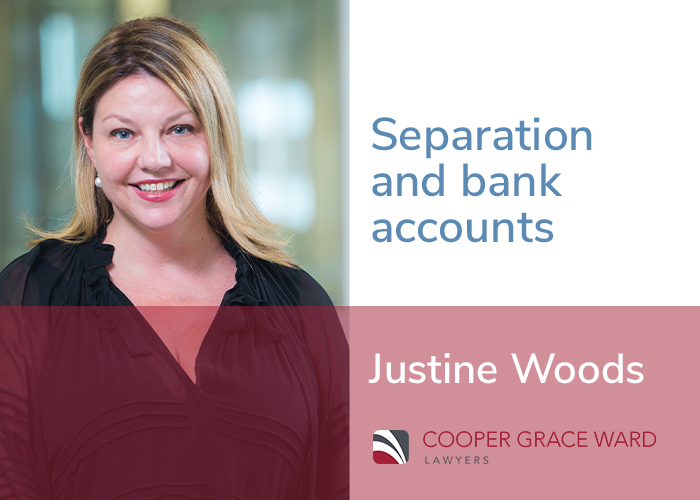Cooper Grace Ward has been announced as the winner of four categories in the latest Beaton Client Choice Awards: Best Australian Law Firm, Best Professional Services Firm, Most Innovative Law ...

In this video, CGW family law partner Justine Woods talks about separation and bank accounts.
Hello, everyone. I’m Justine Woods, the family law partner at Cooper Grace Ward.
Now, this might seem an unusual topic to discuss in a purely family law presentation, but I thought it might be helpful to consider some issues around banking.
Now, not in every family will banking arrangements look the same.
Some people never have joint accounts. Some people have nothing but joint accounts. I’ve acted for people who only ever had one account in one person’s name and all of their money went there. Often people are running companies and trusts and their entities have their own bank accounts.
So, some absolutely cardinal rules for banking.
If you are not a director of a company or the trustee of a trust, but particularly the company, do not remove any money from the accounts. There are cases decided in Queensland and all the other jurisdictions in Australia to say that that can be an offence post separation.
Now, there are, of course, some very tricky matters where everyone has been living out of the company account in the family, regardless of its true independent corporate nature. They are hard to unravel and a pre-separation practice might continue post separation without too much drama there, but perhaps not. So, if you can avoid that, do so.
Take advice before you do anything dramatic. Even putting the money back later can sometimes not restore you to the same position that you held previously. So, be very conscious of that.
I often see some people default to sweep half of the money of joint accounts into their own bank account. That will stir things up quite significantly. It may be necessary. It may be that you have legitimate cause for doing so and it’s a joint account. Bear in mind, consequences will flow from that and it arcs up the hostility significantly in most cases.
If you can reach an agreement about that, that’s very neat. You’ve got a division early on.
Sometimes, and this really can flow naturally in some matters, people just keep banking as they were. That has some interesting dynamics about it, because then everybody has oversight. The other spouse has oversight about what’s coming in, what’s being spent. That is interesting in a disclosure process where people are often very concerned about where people are going, what they’re spending on entertainment and often on third parties. But there’s nothing inherently wrong with maintaining your joint banking arrangements.
I just say to people, begin to monitor. If you’re a person like myself who never looks at bank statements at all, then maybe you would start to do so because if spending is continuing largely unchanged and the patterns are normal, you might not do anything about it.
That also has the effect that sometimes when you’re sharing income, you will also share in the tax debt at the end. So, that can be something very important to consider.
But overall, banking is just one part of a family law matter that has to be addressed.
We always try and close off any joint accounts, your liabilities as part of your banking portfolio – it’s vital that they’re all addressed.
Lots of people just say: ‘Oh, I’ll keep, we’ll each keep our own debts.’
Now, what one person considers their own debt is not necessarily what the creditor thinks is their own debt. So, we’re absolutely scrupulous in saying, are there guarantees, are there any forms of directors’ guarantees, of guarantees given to suppliers? Are there any – you think you’ve got your own credit card, but really you’re only the subsidiary cardholder.
So, we try and cover every facet of a person’s banking life, as expensive as the whole banking operation can be – because what you want at the end, whether you’ve chosen the path of separation or not, is to really have independence of finance and no ongoing liabilities to the extent that it’s possible.
If you need any help with this or any other family law issue, you’re very welcome to contact us here at Cooper Grace Ward.
Read on for more information on separation and the impacts of emptying joint bank accounts.
This publication is for information only and is not legal advice. You should obtain advice that is specific to your circumstances and not rely on this publication as legal advice. If there are any issues you would like us to advise you on arising from this publication, please let us know.
Subscribe to our interest lists to receive legal alerts, articles, event invitations and offers.

In this edition of It depends, family partner Justine Woods discusses whether you can safeguard an intergenerational family business from a family law claim. Video Transcript Hello. Hello, everyone. ...
Cooper Grace Ward acknowledges and pays respect to the past, present and future Traditional Custodians and Elders of this nation and the continuation of cultural, spiritual and educational practices of Aboriginal and Torres Strait Islander peoples.
Fast, accurate and flexible entities including companies, self-managed superannuation funds and trusts.